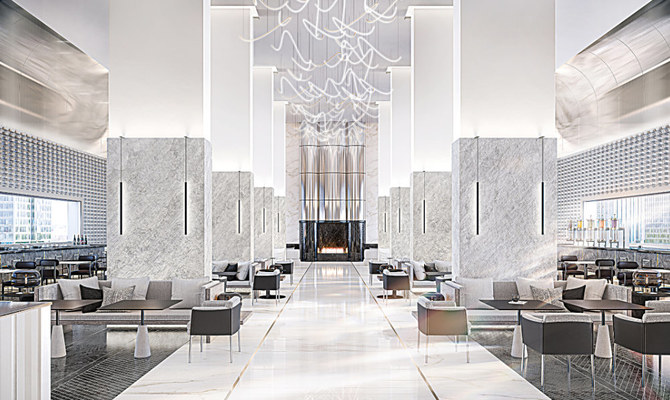CAIRO: Saudi Arabia-based fintech Simplified Financial Solutions Co. has closed a $10 million seed round led by Sanabil Investments, a wholly owned subsidiary of the Public Investment Fund, and RAED Ventures.
Other participants included anb seed, Rua Ventures, Byld, and KBW Ventures, along with previous investors Khwarizmi Ventures, Seedra Ventures, and Tech Invest Com.
Founded in 2021 by Ahmed Al-Hakbani, SiFi is a business-to-business spending management platform offering smart corporate cards, real-time insights into corporate spending, and automated expense management workflows.
Al-Hakbani, CEO of SiFi, said: “We are thrilled to have closed this significant round and gained the support of such prominent and strategic partners. This funding will enable us to further enhance our offering, deliver even greater value to our customers, and cement our position as the go-to spend management solution in Saudi Arabia,”
He added: “Our aim is to empower stakeholders within companies to make informed decisions at the right time while providing finance teams with the tools they need to effectively enforce company spending policies. By doing so, we aim to help businesses decentralize spending while enhancing control and driving growth.”
This funding will enable SiFi to enhance its offerings and solidify its position as the leading spend management solution in Saudi Arabia.
“What attracted us to SiFi was three-fold: its outstanding team, compelling product offering, and the largely underserved market in Saudi Arabia, as businesses are increasingly recognizing the need for more efficient financial management tools. We look forward to supporting their next phase of growth and helping them capture the opportunity ahead,” a spokesperson for Sanabil Investments said.
MENA startup investment surges in May 2024
Investment in the Middle East and North Africa region saw a significant surge in May, with a total of 40 startups raising $282 million, a 413 percent increase compared to April’s $55 million.
This growth was primarily driven by debt financing, which accounted for nearly $140 million of the total raised, according to Wamda’s monthly report.
Despite this monthly growth, the year-on-year deal value saw a notable decline of 58 percent, dropping from $445 million reported in May 2023 across 39 deals.
UAE’s Property Finder led the investment with a $90 million debt round, followed by Huspy and Keyper securing $37 million and $34 million, respectively, the latter with $30 million in debt financing.
UAE-based startups received the majority of investments, amassing $189 million across 23 transactions.
Saudi startups followed with $56 million over 10 deals, while Egyptian startups secured $24.5 million across four deals, including OneOrder’s $16 million series A round combining debt and equity.
The proptech sector was the top-funded, raising $167.2 million over seven rounds. The fintech sector followed with $32.7 million across 12 startups. The logistics sector also saw significant funding, with $25.3 million secured by three startups.
The agritech sector showed signs of recovery with $23 million raised in May, including $16 million for Iyris’s series A round.
Software as a service startups also rebounded, securing $27 million across three transactions. The region’s venture capital space emphasized later-stage rounds, with $59.3 million raised by five startups at their series A stage and $44 million by four startups at their pre-series A stage. Seed stage deals topped the count with seven deals worth $11 million.
UAE’s GrubTech was the only startup to close a series B round at $15 million, while Saudi Arabia’s SaaS startup Merit raised $12 million in a pre-series B. Up to $42 million went undisclosed regarding stage rounds, with seven startups not revealing their stages.
Business-to-consumer startups comprised 62 percent of total funding, raising $174 million across 13 deals, while B2B startups raised nearly $100 million.
Male founders continued to dominate, securing 89 percent of the total investments. However, there was an increase in deals involving co-founded startups by males and females, doubling to eight deals compared to last month and raising $28.6 million, while female-founded companies secured $800,000.
The venture capital space in the MENA region witnessed significant activity in May, with several new funds launched.
BIM Ventures and Japan’s SBI Holdings introduced a $100 million fund, UAE’s TVM Capital Healthcare launched the $250 million Afiyah Fund LP, and Riyad Capital initiated 1957 Ventures. Saudi Venture Capital committed $30 million to General Atlantic for Saudi startup investments.
Bahrain’s Investcorp closed a $570 million Investcorp Technology Partners V fund, and Shorooq Partners along with Korea’s IMM Investment Global launched a $100 million fund.
Singapore-based Golden Gate Ventures announced a $100 million MENA fund, and Saudi Arabia-based HRtech Qsalary partnered with Itqan Capital for an $80 million investment fund.
In Egypt, Beltone and Microfinanza Italia launched a $2.4 million project to support the startup landscape, and the $3 million Glint Fund II was also introduced.
Additionally, Saudi Arabia’s Kingdom Holding participated in the $6 billion Series B round of Elon Musk’s artificial intelligence startup, xAI, valuing the company at $24 billion.
UAE-based AI startup qeen.ai secures $2.2m pre-seed funding
UAE-based AI startup qeen.ai has successfully raised $2.2 million in a pre-seed funding round led by Wamda Capital, with participation from various international and regional investors, including 10x Founders, Aditum, Dara Holdings, Jabbar Group, Phaze Ventures, and Eureka 460.
Founded in 2023 by Dina Al-Samhan, Ahmad Khwileh, and Morteza Ibrahimi, qeen.ai focuses on providing accessible and autonomous AI solutions tailored to e-commerce businesses.
“We are thrilled to back qeen.ai in their mission to disrupt the e-commerce space in the MENA region,” said Fadi Ghandour, CEO of Wamda Capital and founder of logistics giant Aramex.
He added: “We believe that qeen.ai is well poised to achieve substantial growth and success, as it fulfills a crucial market need by providing businesses with accessible AI solutions that can significantly improve their revenue, thanks to the founder team’s expertise in AI and their deep understanding of e-commerce challenges.”
The newly acquired funds will be utilized to further the company’s mission to simplify intelligent commerce, making AI solutions more accessible and user-friendly for businesses of all sizes.
Fintech company Elevate secures $5m in pre-series A funding
London and Dubai-based fintech company Elevate has secured $5 million in a pre-series A funding round.
Founded in 2021 by Khalid Keenan, Faris Keenan and Youcef Oudjidane, Elevate offers debit cards for online spending and applies standard foreign currency exchange rates when sending money domestically. The company also allows users to transfer money back to their local accounts for a fixed fee.
Elevate aims to provide a financial solution to address common challenges faced by freelance professionals.
The platform facilitates effortless payments from US and international employers and major freelancing platforms such as Upwork, Maqsam, PayPal, Deel, and Toptal.
Elevate claims to have attracted over 150,000 users from Asia and North Africa. The newly raised funds will support the company’s expansion into the Middle East and Africa.
























